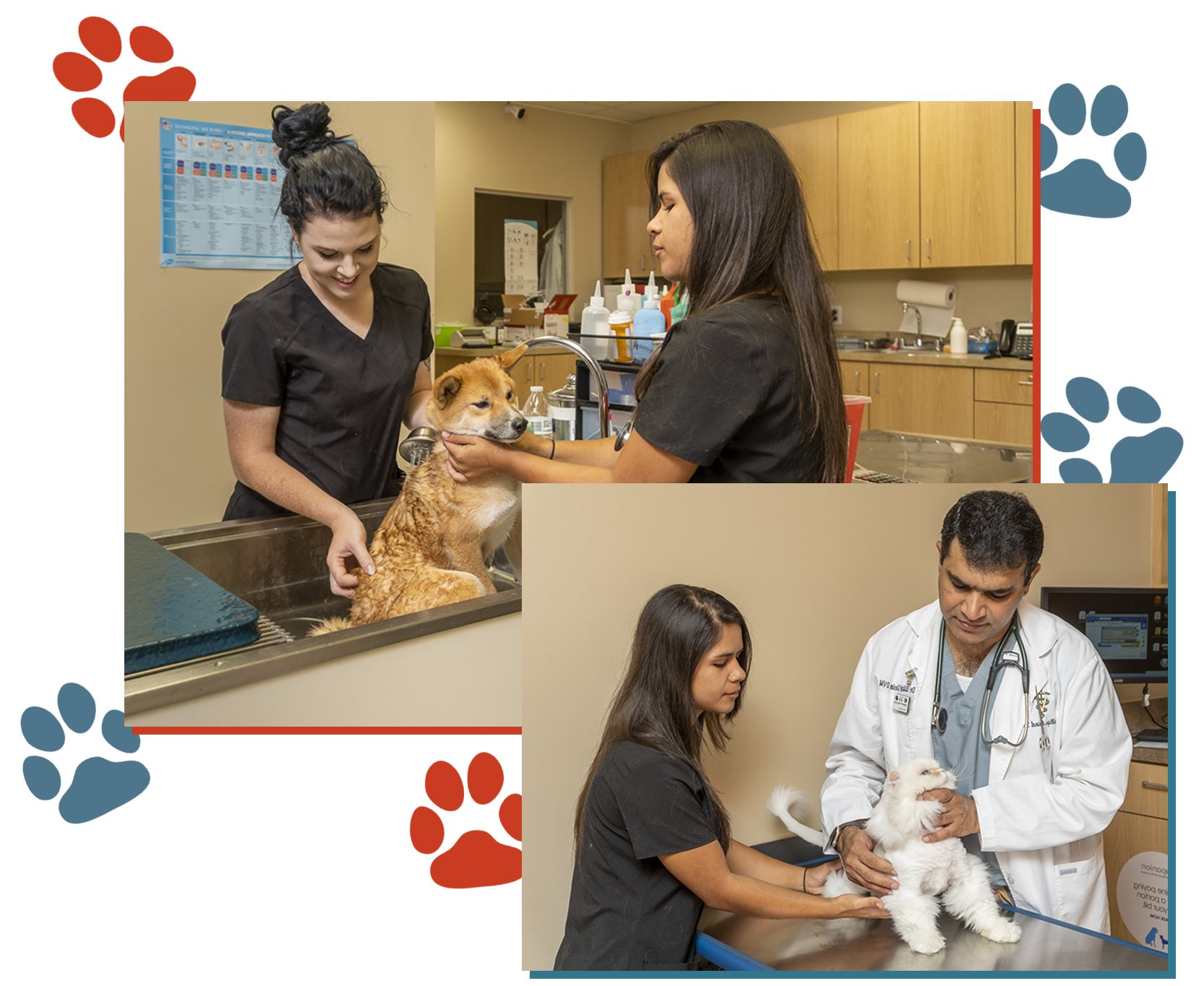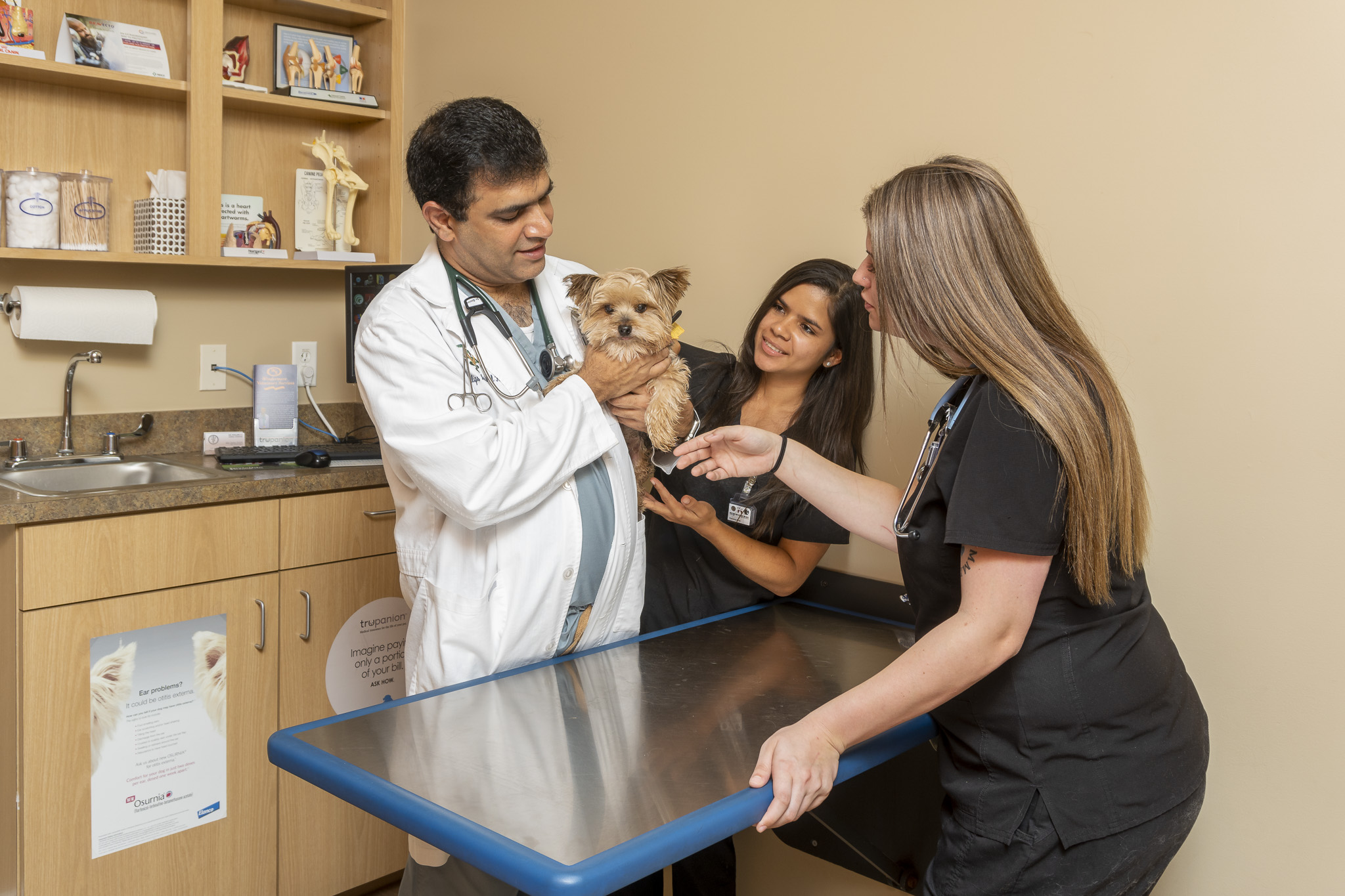
We're here for you
Emergency?
If your pet is exhibiting concerning symptoms or experiencing a medical emergency, please call our clinic at (407) 352-2579. We’ll help you through it.
We all occasionally experience coughing, and our pets are no exception. In fact, it's just an instinctive reflex that helps sweep away anything blocking their air passages. But, if your pet's cough is persistent and worrying, it would be wise to visit the vet for an evaluation. While coughing in animals is quite common, the doctor can determine if adjustments need to be made to your furry friend's environment, diet, or medication to help alleviate their coughing.
The most common causes of coughs in your pets vary from species to species, but generally, they can result from anything from allergies or a mild illness to something more severe.
The Most Common Reasons Why Your Dog Is Coughing
Allergies, kennel cough, pneumonia, heart disease, and tracheal collapse are the most common explanations for your pup's coughing.
Allergies

Allergies are the body's exaggerated reactions to specific environmental triggers, and just like humans, our furry friends can also suffer from allergies. If your pet is coughing or sneezing more than usual, there's a chance they may have an environmental allergen.
Thankfully, there are plenty of ways to treat and manage allergies in pets. From medication to hypoallergenic diets, your vet can help you figure out the best plan for you and your four-legged companion.
Kennel Cough
If you observe your dog coughing harshly and dryly, it could be a sign of kennel cough. This highly contagious condition can result from both bacteria-caused or virus-induced illnesses, although usually only causing mild irritation. However, if left untreated, in some cases, the disease may develop into more drastic problems such as pneumonia or bronchitis.
Luckily, kennel cough can easily be treated with medicines from your veterinarian, so be sure to have your dog's cough checked out by their doctor.
Pneumonia
Just like in humans, pneumonia can be serious for your canine friend if not treated promptly. It typically occurs in dogs with weakened immune systems, such as puppies and seniors.
Look out for a wet "moist" cough that indicates fluid in their lungs - even when they aren't coughing, their breathing will appear labored. Don't hesitate to seek veterinary advice right away by getting on the phone with your vet and scheduling an appointment immediately.
Heart Disease
Congestive Heart Failure is a potentially life-threatening condition that occurs when the heart fails to pump efficiently, resulting in fluid accumulation in the lungs. If your canine is having persistent coughing episodes while they are at rest or asleep - this is indicative of possible fluid buildup surrounding their lungs and should be addressed immediately by consulting your vet for treatment options.
Tracheal Collapse
Small or overweight dogs can be more prone to suffering from a tracheal collapse. One tell-tale sign of this condition is a honking cough akin to what one would hear coming from a goose. Medicines that widen airways, reduce swelling, and address bacterial infections can make a real difference.
Additionally, changes in the home environment, such as using humidifiers and reducing air pollutants, can also be beneficial. If all else fails, surgery may need to be considered to provide your furry friend with the quality of life they deserve.
The Most Common Reasons Why Your Cat Is Coughing
As cat owners, we all love to hear the sound of our furry friends' purring. But when they start coughing, it can be concerning. Although coughing can be symptomatic of several different health issues in humans and dogs, persistent feline coughing almost always signals a respiratory problem. The most common causes of your cat's cough are infections, asthma, fluid surrounding the lungs, trauma to the respiratory system, and cancer.

Infections
One culprit for that persistent cough is a bacterial or viral respiratory infection, often with symptoms like sneezing and fever. These infections can cause inflammation and lead to a continuous dry or wet cough.
If you notice any of these signs, it's best to take your pet to the vet as soon as possible. They can diagnose the issue and prescribe the appropriate treatment to get your pet feeling better in no time.
Asthma
Feline asthma is an allergic response to airborne pollutants and can present itself through coughing or wheezing in affected cats. However, it's essential to differentiate between coughing from the condition and asthmatic assaults. Most cats will pant with an open mouth during attacks, accompanied by tongue or gums that may appear bluish or grayish in color.
Asthma episodes are often considered medical emergencies requiring immediate attention, so if you think your feline friend is suffering an asthma attack, get them to a clinic.
Pleural effusion
Pleural effusion is an irregular accumulation of fluid around a cat's lungs that can lead to coughing, wheezing, and difficulty breathing. If left untreated, it can be life-threatening for your feline companion.
If your veterinarian suspects pleural effusion, X-rays, and ultrasounds can be used to diagnose and help determine its cause.
Respiratory Trauma
Respiratory trauma, such as physical harm, chemical exposure, or sudden temperature changes, can lead to a cat coughing. In these cases, other symptoms will often accompany coughing, such as difficulty breathing, mucus buildup in the throat, and even nosebleeds.
It's important to consistently observe your pet for any changes that may indicate coughing is due to a trauma-related issue.
Cancer
Coughing is frequently one of the earliest signs pet owners observe when their cats have cancer impacting the respiratory system. Tumors of the respiratory tract can lead to persistent coughing in cats. If your vet suspects cancer is causing your cat’s cough, they will likely suggest further tests, such as a chest X-ray and bronchoscopy, to confirm the diagnosis.
If you've observed your cat coughing persistently for more than two weeks, it's vital to reach out to your veterinarian for a thorough examination and diagnosis to determine the cause
Schedule a Check-up With Your Veterinarian
If your pet is experiencing a recurring cough, be sure to call your veterinary clinic. When scheduling your veterinary appointment, make sure to mention your pet's coughing to get the most accurate diagnosis possible. Your vet may recommend different tests to help determine the root cause of the cough. With the proper care, your pet will be back to their lively self in no time.

Step One:
Call us to book your pet’s appointment.

Step Two:
Our expert vet will take care of all of your pet’s needs.

Step Three:
Get back to enjoying your happy and healthy life with your furry best friend.

Get the Best Care for Your Pet
Come Visit Dr. Qasim
Book your pet’s appointment with Dr. Qasim to ensure a long, happy life together.

We love and care for each patient as if they were our own pet.
Meet Our Team of Animal Lovers
Dr. Bilal Qasim, DVM, established Dr. Phillips Animal Hospital in 2011 after practicing veterinary medicine for over 17 years with the help of talented and caring veterinary technicians.


